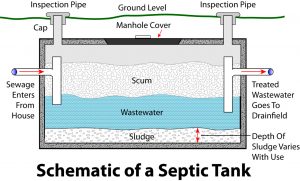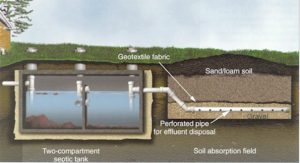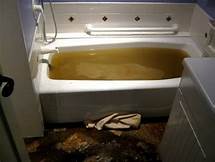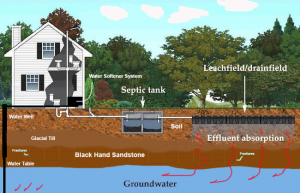How does weather affect your septic system? It doesn’t, does it? After all, your septic system lies buried, safe and secure from the ravages of the elements, right? Wrong. Extreme weather — in any season — can create serious problems for any septic system. This month we’ll take a look at how rainy and stormy weather can affect your septic system.
Septic system basics
Most septic system owners have a vague understanding of how their systems work. A quick review of the components and functions of your system will provide a clearer understanding of how weather affects it.
 Tank
Tank
Basic septic systems have two main parts: a septic tank and an absorption field. As the Environmental Protection Agency defines it, a septic tank is “a buried, water-tight container usually made of concrete, fiberglass, or polyethylene.” Tanks come in a variety of shapes and sizes. The breakdown of sewage begins in the tank. First, wastewater from the household flows into the tank through a drainage pipe. Then the tank holds the wastewater from the household long enough for the solids to settle to the bottom of the tank. During this process, oil and grease in the water float to the top and form a scum on the surface. Finally, the liquid part of the wastewater (effluent) exits the tank and drains into the absorption field.
Drainfield
The second part of the system is the drainfield. The EPA gives a good definition of this element, also. “The drain field is a shallow, covered, excavation made in unsaturated soil.” This soil absorbs and percolates the wastewater, allowing harmful substances to be broken down naturally.
How does weather affect your septic system: Raining & Flooding
In many parts of the country, spring and summer mean dramatic increases in rainfall. Crops and plants require adequate rainfall. However, too much rain can be hazardous to septic systems. For example, drainfields saturated by heavy rain cannot adequately absorb household wastewater. As a result, heavy rain and flooding cause two types of problems.
Problems inside and out
Backup
 With no adequate outlet for effluent, a septic tank quickly fills. In the meantime, wastewater continues to drain from the home. A saturated drainfield causes household wastewater to back up into the drainage pipe. This backup, containing contaminated water and sewage, continues to back up through the system into the toilet and drains in the home. If this happens, you need to call a professional immediately. Wastewater contains harmful pathogens so it requires a HAZMAT clean-up process.
With no adequate outlet for effluent, a septic tank quickly fills. In the meantime, wastewater continues to drain from the home. A saturated drainfield causes household wastewater to back up into the drainage pipe. This backup, containing contaminated water and sewage, continues to back up through the system into the toilet and drains in the home. If this happens, you need to call a professional immediately. Wastewater contains harmful pathogens so it requires a HAZMAT clean-up process.
Contamination

In addition to causing problems inside the home, heavy rain and saturated ground also wreak havoc on nearby water sources. Wastewater unable to soak into the ground flows to the lowest area. This often results in contamination of nearby wells and even sometimes local groundwater supply sources.
Prevention
The best cure for septic systems at risk from heavy rain or flooding lies in prevention. For example, take steps before the rains start to secure your system. How can you do that? Here’s what we recommend for starters:
- Have your tank pumped regularly (yearly or bi-annually at the most).
- Use high-efficiency appliances (toilets, showerheads, washing machines, dishwashers, etc).
- Spread laundry chores over several days.
- Only flush human waste and toilet paper.
- Do not park on the drainfield.
- Plant trees far enough from drainfield that roots will not interfere with the septic system.
- Make sure any guttering leading from the drainfield is clear of debris.
For a detailed list of maintenance suggestions, visit the EPA website.
Conclusion
A well-working septic system provides many advantages to a homeowner. Be sure to get your system ready for the spring and summer storms. Call us today to set up a consultation to make sure you’re prepared.
